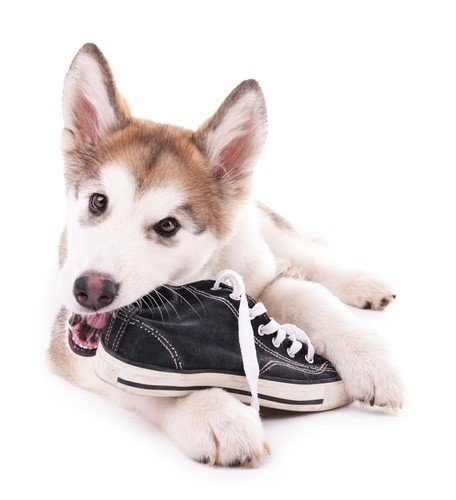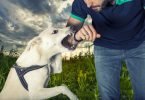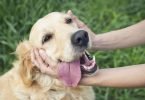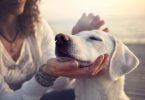Everyone loves puppies, and adopting a puppy may be the best day of a dog lover’s life! Much like babies, puppies chew almost everything in sight. Is puppy chewing things normal? Is this behavior acceptable? A person needs to train and teach a puppy about what kind of behavior is acceptable and what is not.
If you want to know how to stop a puppy from chewing whatever it lays its eyes on, you can go and check out the article How to stop a puppy from chewing everything: puppy chewing solutions 101. In that article, you will find several solutions and methods on how to stop a puppy from chewing and stopping this destructive habit in time.
In the current article, you will find your answers to general questions about puppy chewing behavior and everything related to this issue, including a brief solution on how to stop a puppy from gnawing. The response to “when do puppies stop biting and teething” is eight months. Continue reading to find out more.
What is puppy chewing behavior? Why do puppies chew things?
If you own a puppy or owned a puppy at one point, you will know about the excessive chewing and the attempts to gnaw on everything they see. This phase in a puppy’s life is the puppy chewing behavior and is a very regular occurrence. If a dog owner does not control this puppy habit on time, it may cross the line and enter the destructive chewing sphere.
Much like humans, even puppies chew on things to get relief from sore gums and also out of curiosity. Even babies have a habit of putting things in their mouth to inspect items. Just imagine that for a puppy, they do not have hands to speculate; all they have are paws and a mouth with sharp teeth.
To puppies, every new item they see is a thing of marvel and wonder. So, every household item which seems unusual to its eyes will be a victim of getting bitten or gnawed on. The first instinct they get each time they see any new thing is to put it in its mouth and explore it. Puppies are curious creatures, and chewing is how they explore things in their early days.
Another reason why your puppy may be chewing on things is because of teething. Teething causes sore gums. Puppies may end up eating and gnawing on something to get relief from this annoying and constant pain.
All you need to know about a teething puppy
Teething is when a puppy starts to get its first set of baby teeth, which is usually 28 in number. These teeth harmlessly fall out to give a set of 42 adult dog teeth. A dog owner might want to know the answer to “when do puppies stop biting and teething?” The answers to some frequently asked questions regarding the teething of a puppy are as follows:
When do puppies start teething?
Puppies start the teething process once they begin to wean from their mother’s milk. That is, at around five to six weeks after birth, a puppy will start to get its first set of teeth in the form of 28 “milk teeth.” In some cases, puppies start teething only at eight weeks, while some may begin to develop their baby incisors at two weeks. Puppies find teething painful and annoying and will seek any relief during the puppy chewing phase.
With the start of teething starts the puppy chewing behavior. At an average of seven weeks, complaints about a puppy chewing carpet and shoes, or a puppy chewing wood become very common. A puppy will gnaw on low lying household items to provide itself relieve from the pain of sore gums.
When do puppies start losing their first set of teeth?
One interesting fact about puppies teething is that they lose their baby teeth a lot quicker than they took to form them. After around one week of developing its milk teeth, the puppy will start losing them beginning from the incisors, then to the others. By the third month of the puppy’s life, it will entirely lose all its milk teeth and get ready to form an adult set.
At this point, dog owners should take their dogs to the vet to check if there are any baby teeth left. In case there are some left, the vet will need to extract them so that there is enough space for the new set of teeth to grow. If your puppy does not get this procedure done, the alignment of the permanent set of teeth may come out wrong and cause problems while eating in the future.
When do puppies stop teething?
The answer to the question, “when do puppies stop teething?” may vary from breed to breed. However, in most cases, the average time at which a puppy will stop teething is eight months. By this time, the puppy would have grown into a dog and have 42 teeth.
As a dog stops teething, the dog will also stop chewing on random household items only if the dog owner made sure of teaching the dog that chewing is not a good habit and should chew only when necessary, that is, only while teething.
How will a dog owner know when their puppy is teething?
The teething process in puppies is almost unnoticeable besides its excessive chewing habits. Some other clear signs which show that your puppy is teething is an evident increase in drooling and bloodstains in the puppy’s chew toys. Experts advise dog owners to take puppies showing these symptoms to a vet to make sure the puppy does not have a severe problem.
What should dog owners do when their puppy is teething?
Dog owners should provide their teething puppies with chew toys so that they get the relief they want and not go on a destructive chewing spree. Make sure the puppy does not tatter the chew toy into pieces. The puppy chewing the toy should not be able to swallow any part of the toy.
What age do puppies stop biting if dog owners do not train it?
Even without training or teaching a puppy not to bite, it will naturally stop biting by the time it stops teething, that is after it turns into an adult at eight months. If the dog owner does not continuously play with the puppy and trains it well, the biting will start to decrease even at five months before growing into an adult.
In other words, the answer to “what age do puppies stop biting” is dependent upon how much attention and playtime with the owner a puppy gets. If this time and attention are not much, the puppy will stop biting in no time. But if the dog owners play with the puppy very often, it may take more time to stop biting, or it may even continue this puppy chewing behavior into its adult years.
How to stop puppy chewing everything during the teething phase
Puppies are bound to go through a teething phase that the puppy usually combines with excessive chewing and biting. There are two main methods of solving this controllable problem. The first way to stop a puppy from chewing everything is to puppy-proof the house. Another way to control this problem is to provide the puppy with the right puppy supplies to help it through the chewing phase.
Giving your puppy chew toys is an excellent way of controlling it from destructive gnawing. Dog owners can stop a puppy chewing carpet and shoes by giving it an appropriate chewing toy. A puppy chewing wood of furniture would like to chew on puppy chewing sticks. Some of the best chews for puppies available on Amazon are as follows:
HDP Spots Blanket
This product is a blanket that is perfect for puppies who like to snuggle and chew at the same time. It has a squeaker inside the head of the quilt and comes in three different units. It is one of the best chews for puppies.
Nylabone Key Ring Chew Toy
This textured chew toy teaches a puppy all about healthy chewing habits. The manufacturers of this chew toy kept puppies on their mind and designed it in such a way that the material will be perfect for teething puppies. It has bristles on it, which help to clean the puppy’s teeth. It is one of the most liked puppy chewing toys on Amazon.
N-bone Flavored Teething Ring for puppies
N-bone has come up with a chicken flavored teething ring, which is easy to grab for puppies and ideal for milk teeth. One bag of this product contains six flavored teething rings and has added calcium and Omega 3 Fatty acids for the health and proper growth of the puppy.
KONG Classic Dog Toy
For aggressive teethers and chewers, this dog toy by KONG is the ideal chew toy. The rubber material that makes up this toy is very durable and bounces well. A dog owner can fill this product up with KONG treats, and the dog toy will timely dispense the treats while the dog is playing with it. A puppy owner can control puppy chewing habits with this toy.
NatureGnaws
Puppy chewing sticks also do the same job as puppy chew toys when puppies are teething. This product contains only one ingredient, which is 100% natural beef bully sticks, which is very tasty and lasts for a long time. It does not contain any artificial ingredients.
Other reasons for excessive chewing
Teething is a natural reason for a puppy to chew and gnaw on everything they see. This teething phase starts when the puppy is around two weeks until around eight months after the dog develops its set of 42 adult teeth.
However, some dogs are unable to stop chewing on furniture, shoes, and carpets even after growing into a full adult. If this happens, the dog owners start to ask, “when do puppies stop biting and teething?” and while this is a valid question, the answer remains the same, the teething stops after eight months.
So then, another question, when do puppies stop chewing everything after it goes through teething, remains. There is no definite answer to this question. It depends on several factors, some of which are as follows:
An untaught puppy
If dog owners fail to teach their puppy what to chew and what not to chew during the teething phase, the grown puppy is likely to carry on the same gnawing behavior into its adult life. If the puppy used to chew on shoes, and the dog owner does not do anything to correct the action, the puppy may continue to chew on shoes even after it passes its teething stage. The only thing to do in these kinds of situations is to get it a chew toy or puppy chewing sticks.
A bored dog
Most dog breeds are very active by nature and get bored quickly if it does not get enough physical and mental activity. As a result of boredom, a dog may chew on things to keep itself occupied. One thing dog owners should know about dogs is that a well-exercised and healthily tired dog is a disciplined and obedient dog. Take your dog out on walks so that it gets the right amount of physical activity. You can solve the problem of a puppy chewing due to excess energy that way.
Fear-related reaction
Some dogs tend to bite or chew on things as a result of fear. Just like unintended behavior in humans like sweating and biting nails, if they are scared or nervous, some dogs react to fear by biting or chewing things. Dogs may even go as far as biting people or other animals, which they see as intruders. An animal expert’s advice will be necessary for these kinds of biting behaviors.
Attention-seeking behavior
If a dog was the apple of the family’s eyes during its puppy years and got a lot of attention during those days, the dog may chew on things to gain back that same attention. This behavior is standard even amongst dogs, which got negative attention when it gnawed on something it should not be chewing on.
Separation anxiety
A dog that suffers from separation anxiety is prone to chewing on furniture, shoes, and carpets as a result of distress. Since separation anxiety in dogs is quite common, and most dog owners may not be aware of it, this article shall dive in deeper into this particular problem.
What is dog separation anxiety?
If your dog suffers from a problem called separation anxiety, it will show signs of distress and behavioral issues every time you leave it alone. This response takes only a few minutes to show up, which is around twenty to twenty-five minutes after leaving it. Some common problematic reactions are a dog or puppy chewing, scratching on doors and walls, barking, howling, urinating, defecating, and digging whatever they can.
Does your dog have separation anxiety?
There are many symptoms which your dog needs to check before finalizing that it has separation anxiety. Some sicknesses are easily diagnosable by checking if it has one or two of that sickness’s symptoms. But with separation anxiety, you have to check if your dog exhibits all the signs before going ahead with the treatments for separation anxiety.
The symptoms or behavior of a dog suffering from separation anxiety are as follows:
- The problematic behavior only starts when you leave your dog or puppy alone without anyone with whom they can play or spend time.
- Your dog or puppy follows you everywhere you go, even from room to room, while you are at home.
- The dog or puppy greets you with such excitement and gushing happiness every time you see it.
- Your dog displays problematic manners and habits regardless of the time spent alone, whether it is a short time or a long time.
- The dog shows signs of depression and anxiety when it sees you getting ready to leave the house or leave your dog alone.
- Your dog does not like to spend time outside if it is doing so, alone without your companionship.
No one knows the exact reason why a dog may suffer from separation anxiety. Nonetheless, some probable causes of this anxiety are:
- Changes in the routine of the dog and the owner
- A new environment in the form of a new house or home
- After experiencing a traumatic event in the absence of the dog owner
- The experiences related to first crate training
- Introduction of a new pet
What not to do if your dog has separation anxiety
There are a few points that dog owners need to keep in mind if their dog has separation anxiety. Let us discuss these points one by one:
Punishing your dog
Dog owners cannot cure their dog’s separation anxiety by punishing it. If you punish your dog when it shows separation anxiety behavior, this reaction will only intensify the problem and cause more problems in the future.
Using a crate
If you did not crate train your dog before, trying to crate train it to cure its separation anxiety will not help in the least. This sudden crate introduction will make the dog’s separation anxiety even worse.
Bringing home another pet
Separation anxiety arises from separation and isolation from the dog owner and not due to the absence of a friend. Bringing home a new pet, like a puppy or cat, may cause the distressed dog to feel more anxious than before.
Using sounds and noise
Some dog owners think that using loud noises or distracting sounds will help in solving the problem of their dog’s separation anxiety. However, this cannot be further from the truth. Loud noises and sounds from the television or radio alarms even healthy dogs, let alone distressed dogs with separation anxiety.
When do puppies stop chewing everything if it does not have separation anxiety?
Puppies are usually supposed to stop chewing and gnawing on everything once they pass the teething stage that is eight months. In some cases, if the owner does not teach the puppy what kind of chewing is acceptable and what kind of chewing is not, the puppy may take more than eight months to stop gnawing on everything.
When do puppies stop chewing everything after being diagnosed with separation anxiety?
A dog or puppy with separation anxiety will take longer to get rid of its chewing habits. The treatment may take a few weeks to become effective. If the procedure is successful, the dog will learn not to chew in the absence of its owner, within a month.






